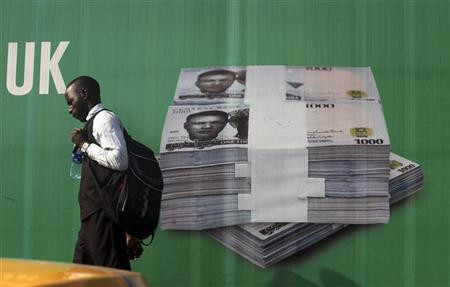Nigeria's ban of foreign currency deposits 'good for economy and naira'

The Central Bank of Nigeria (CBN) has welcomed a decision by national banks not to accept cash deposits in a bid to bolster the country's currency. In a statement on its website, CBN said the decision was made to avoid illicit financial flows in the country's banking system. The statement also specified that only wire transfers were allowed and advised citizens who wished to obtain foreign currency "for legitimate purposes" to source it through "recognised channels".
CBN said the decision follows banks' growing concern regarding the amount of foreign currency in their vaults. "Therefore, in its continued efforts to stop illicit financial flows in the Nigerian banking system which aligns with the anti-money laundering stance of the federal government, the CBN hereby prohibits from the date of this circular the acceptance of foreign currency cash deposits by [Deposit Money Banks] DMBs," the statement read.
According to Peter Walker, director of Pielle Consulting Ltd, the decision is part of the country's attempt to strengthen the naira and improve the crippled economy following the depreciation of the currency and the fall of oil prices.
Nigeria
Capital: Abuja
Population: 174,507,53 (2013 census)
Largest cities: Lagos, Kano, Abuja
Major ethnic groups: 21% Yoruba, 21% Hausa,
18% Igbo
Languages: English, Hausa, Igbo, Yoruba
Religion: 50% Muslim, 40% Christian, 10% other
Currency: Naira (N) 1N = £0.0033; US$0.0050
"Any banks that find themselves with a large amount of foreign currency deposits are going to regard these deposits as potentially destabilising, because they don't have control over them," he told IBTimes UK.
"If you have dollars in your wallet now, can you guarantee that they are going to be worth [a certain amount] in naira, or euros tomorrow? No, because you don't have control over the dollar exchange rate. This is, to a certain extent, a move by the banks to reduce their risk and exposure as well as aligning with the central bank's activities to strengthen the naira.
"The central bank governor made the point that there is also the issue of too much untraced foreign currency within the country that may have dubious origin, and this is not helpful to the economy. Certainly the central bank, in terms of controlling liquidity and the value of the naira, has to be very conscious of the fact that perhaps reducing the amount of foreign cash can help the economy," he continued.
Walker added that the new government, led by newly elected President Muhammadu Buhari, is committed to promoting national companies and that any decision aimed at strengthening the naira will benefit Nigerian businesses, particularly agriculture and manufacturing.
"There is a general atmosphere in the Central Bank, among the Nigerian Banks and in the Ggovernment at all levels of ensuring that national businesses or businesses within Nigeria are encouraged to develop so that the proportion of their activity within the economy grows," he said.
"Nigeria is a big oil producer and at the moment the agricultural and manufacturing sectors are still neglected and agricultural imports are still too high. Banks have taken steps to both discourage imports and encourage agricultural development within in Nigeria. I believe we should view these moves as part of a package: It is about strengthening the Nigerian economy and the non-oil economy in particular. Any decisions taken by the banks in parallel with the central bank's activities to strengthen the naira has to be good for Nigerian businesses, particularly for the manufacturing and agricultural."
Buhari urged to end oil subsidy and privatise refineries
The decision to ban foreign cash deposits came as President Muhammadu Buhari, who took office in May, was urged to end oil subsidy which, according to some, contributes to further deepen the country's ongoing economic crisis. Nigeria's lack of refineries means that the country – which is Africa's biggest oil producer – has to export about 90% of its crude oil and import back petroleum products at international prices. The government then sells fuel to Nigerians at subsidised prices and reimburses the difference to importers.
Former senator Kabir Marafa said ending subsidies would solve the problem of lack of petroleum products in the country. According to Marafa, oil destined for Nigeria is sold in other African countries at higher prices. Buhari was also urged to privatise the country's oil refineries, so that the state would not spend money on yearly maintenance programmes. In July, three out of the four refineries in Nigeria resumed production after undergoing a rehabilitation program.
In 2012, the government attempted to end subsidies by doubling the price of a litre of petrol overnight, triggering violent protests. Citizens argued that low prices are the only benefit they have by living in the oil-rich nation. The government backtracked on its decision following rallies that caused at least 16 deaths.
Buhari recently launched an anti-corruption investigation to recover funds which he alleged had been stolen during previous administrations. The leader also banned 113 vessels from lifting crude oil from some 27 Nigerian ports amid suspicions the vessels had been implicated in illicit activities and replaced the whole board of state-run oil company Nigerian National Petroleum Corporation (NNPC).
© Copyright IBTimes 2025. All rights reserved.





















